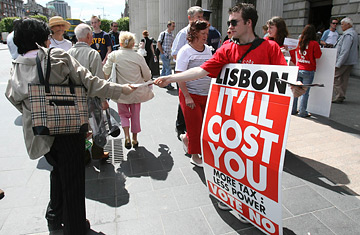
Protestors calling for a No vote before the Lisbon treaty referendum, hand out flyers in Dublin city centre.
Officials in Brussels and other European capitals appeared shell-shocked as they absorbed the news they had dreaded to hear on Friday the 13th: Irish voters had rejected the Lisbon Treaty aimed at updating the European Union's creaking institutions.
Ireland's population of 4.2 million amounts to less than 1% of the E.U.'s 490 million citizens, but in the mire of the defeat that offered no comfort to E.U. officials. The Union's consensus-based decision-making system requires that all 27-member states approve the treaty, and a veto by one is enough to torpedo it. Ireland was the only member state to submit the long and confusing document to a popular referendum, and the resulting "no" vote, by a decisive margin of 54% to 46%, has created a crsisis for the E.U. as a whole.
The Irish result set off a whirl of confusion, with officials struggling to suggest how the E.U. might respond. "The Treaty is not dead," said European Commission President José Manuel Barroso. "We should now try to find a solution." The first step, he urged, would be to continue the process of ratification, a task all other member states have left to their parliaments. "The ratification process is made up of 27 national processes, 18 member states have already approved the treaty, and the European Commission believes that the remaining ratifications should continue to take their course," he said.
If no immediate contingency plan is apparent, it is because the Lisbon Treaty was already the E.U.'s Plan B. It replaced the ill-fated E.U. Constitution, which was rejected by French and Dutch voters in 2005. The Treaty repackages the most important elements of the constitution, including a long-term president, a stronger foreign policy chief, and a more democratic voting system.
Ireland's "no" came despite support for the treaty from virtually the entire Irish political establishment, all leading business and industrial organizations, the trade union movement, farming associations and the mainstream media. They all said Ireland had much to thank the E.U. for, including funding of more than $82 billion since 1973 that had catalyzed the country's recent rapid economic growth, turning it from a source of emigration to booming "Celtic Tiger."
By contrast, organized opposition was led by an unlikely alliance of pacifists, anti-abortionists, traditional nationalists, Marxists and free marketeers. They were greatly aided by the form of the treaty itself — 346 pages of turgid text on the minutiae of Europe's institutional machinery, with no grand project, such as the euro or eastern enlargement, to capture the public's imagination. Many voters said they simply did not understand what they were voting on. At the same time, the "no" campaigners played on public ignorance to raise fears about alleged threats to sovereignty and the Irish way of life in everything from taxation and defense policy to abortion, gay marriage, prostitution and hard drugs.
And what now? The result is unquestionably a crisis for the E.U., which has no obvious way out. The sucker punch of the "no" vote will sap the political will of governments hoping to reform Europe's institutions, said Hugo Brady, from the Centre for European Reform (CER).
"It's going to be massively difficult," Brady said. "Ireland is the only one of the E.U.'s 27 countries to have a referendum on the treaty, as it is legally obliged to do. But the high turnout, and high 'no' vote, suggest we could not expect another referendum any time soon. At the same time, the overwhelming message from those who voted no was that they did not understand the treaty, and that they thought others would vote yes."
E.U. governments have until the end of the year to complete their ratification processes, and Brady said a number of ideas would be floated, but all were hazardous. "One of them could be to try a 26-to-1 situation, where legalese could allow Ireland to continue with the machinery of the old E.U. treaties," he said.
José Ignacio Torreblanca, a senior research fellow at the European Council on Foreign Relations (ECFR), said such a scenario would effectively split the E.U. in two. "The question is whether Ireland can oblige other Europeans to reject a treaty which they do indeed desire," he said. "So what is the alternative? The answer lies in the treaty coming into force in countries in favor of it, providing they make up two thirds or three quarters of member states and the E.U. population."
Some officials say it will simply be business as usual in the E.U. The treaty, like the abortive constitution that preceded it, was often defended on the grounds that the E.U.'s half-century old institutions, designed for a dozen states, couldn't cope with a membership that has burgeoned to 27. Yet decision-making has improved in some cases, as officials and ministers adapt to their new numbers. Indeed, the Czech government, which will take over the E.U. presidency on January 1, 2009, has already prepared a provisional plan on how to deal with a "no" vote by working within the E.U.'s existing structures.
But most officials fear the vote will plunge the E.U. into a period of despondency and inertia. E.U. leaders are due to meet in Brussels on June 19, for a summit which was set to decide on key environmental and energy targets but is instead expected to be overshadowed by a fog of gloom. And unfortunately for the E.U., that looks unlikely to lift any time soon.
